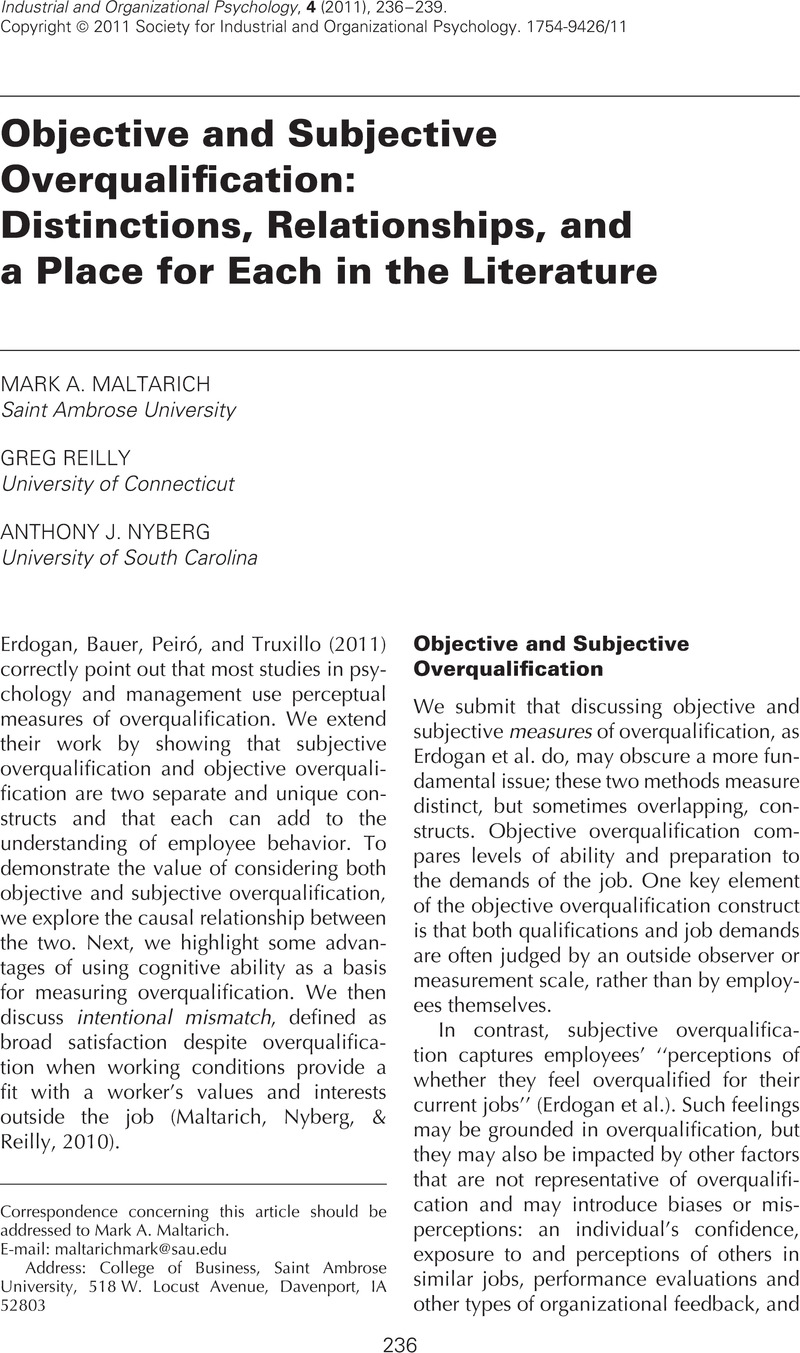Crossref Citations
This article has been cited by the following publications. This list is generated based on data provided by Crossref.
Erdogan, Berrin
Bauer, Talya N.
Peiró, José María
and
Truxillo, Donald M.
2011.
Overqualification Theory, Research, and Practice: Things That Matter.
Industrial and Organizational Psychology,
Vol. 4,
Issue. 2,
p.
260.
Liu, Songqi
and
Wang, Mo
2012.
The Role of the Economic Crisis on Occupational Stress and Well Being.
Vol. 10,
Issue. ,
p.
1.
Thompson, Katina W.
Shea, Thomas H.
Sikora, David M.
Perrewé, Pamela L.
and
Ferris, Gerald R.
2013.
Rethinking underemployment and overqualification in organizations: The not so ugly truth.
Business Horizons,
Vol. 56,
Issue. 1,
p.
113.
G. Martinez, Patricia
L. Lengnick-Hall, Mark
and
Kulkarni, Mukta
2014.
Overqualified? A conceptual model of managers’ perceptions of overqualification in selection decisions.
Personnel Review,
Vol. 43,
Issue. 6,
p.
957.
Thompson, Katina W.
Sikora, David M.
Perrewé, Pamela L.
and
Ferris, Gerald R.
2015.
Employment Qualifications, Person–Job Fit, Underemployment Attributions, and Hiring Recommendations: A three‐study investigation.
International Journal of Selection and Assessment,
Vol. 23,
Issue. 3,
p.
247.
Kulkarni, Mukta
Lengnick-Hall, Mark L.
and
Martinez, Patricia G.
2015.
Overqualification, mismatched qualification, and hiring decisions.
Personnel Review,
Vol. 44,
Issue. 4,
p.
529.
Coff, Russell
and
Raffiee, Joseph
2015.
Toward a Theory of Perceived Firm-Specific Human Capital.
Academy of Management Perspectives,
Vol. 29,
Issue. 3,
p.
326.
Yang, Weiguo
Guan, Yanjun
Lai, Xin
She, Zhuolin
and
Lockwood, Andrew John
2015.
Career adaptability and perceived overqualification: Testing a dual-path model among Chinese human resource management professionals.
Journal of Vocational Behavior,
Vol. 90,
Issue. ,
p.
154.
Zhang, Melody Jun
Law, Kenneth S.
and
Lin, Bilian
2016.
You think you are big fish in a small pond? Perceived overqualification, goal orientations, and proactivity at work.
Journal of Organizational Behavior,
Vol. 37,
Issue. 1,
p.
61.
Fine, Saul
and
Edward, Michal
2017.
Breaking the rules, not the law: The potential risks of counterproductive work behaviors among overqualified employees.
International Journal of Selection and Assessment,
Vol. 25,
Issue. 4,
p.
401.
Harari, Michael B.
Manapragada, Archana
and
Viswesvaran, Chockalingam
2017.
Who thinks they're a big fish in a small pond and why does it matter? A meta-analysis of perceived overqualification.
Journal of Vocational Behavior,
Vol. 102,
Issue. ,
p.
28.
Wassermann, Maria
Fujishiro, Kaori
and
Hoppe, Annekatrin
2017.
The effect of perceived overqualification on job satisfaction and career satisfaction among immigrants: Does host national identity matter?.
International Journal of Intercultural Relations,
Vol. 61,
Issue. ,
p.
77.
Ye, Xiaoqian
Li, Ling
and
Tan, Xuejun
2017.
Organizational support.
Employee Relations,
Vol. 39,
Issue. 7,
p.
918.
Triana, María del Carmen
Trzebiatowski, Tiffany
and
Byun, Seo‐Young
2017.
Lowering the Threshold for Feeling Mistreated: Perceived Overqualification Moderates the Effects of Perceived Age Discrimination on Job Withdrawal and Somatic Symptoms.
Human Resource Management,
Vol. 56,
Issue. 6,
p.
979.
Deng, Hong
Guan, Yanjun
Wu, Chia-Huei
Erdogan, Berrin
Bauer, Talya
and
Yao, Xiang
2018.
A Relational Model of Perceived Overqualification: The Moderating Role of Interpersonal Influence on Social Acceptance.
Journal of Management,
Vol. 44,
Issue. 8,
p.
3288.
ÖZKANAN, Arzu
2018.
ALGILANAN AŞIRI NİTELİKLİLİĞE İKİ YÖNLÜ BAKIŞ: ÇALIŞAN – AMİR DEĞERLENDİRMESİ.
Finans Ekonomi ve Sosyal Araştırmalar Dergisi,
Vol. 3,
Issue. 4,
p.
664.
Wassermann, Maria
and
Hoppe, Annekatrin
2019.
Perceived Overqualification and Psychological Well-Being Among Immigrants.
Journal of Personnel Psychology,
Vol. 18,
Issue. 1,
p.
34.
Zhang, Junwei
Akhtar, Muhammad Naseer
Zhang, Yajun
and
Sun, Shan
2019.
Are overqualified employees bad apples? A dual-pathway model of cyberloafing.
Internet Research,
Vol. 30,
Issue. 1,
p.
289.
Arvan, Maryana L.
Pindek, Shani
Andel, Stephanie A.
and
Spector, Paul E.
2019.
Too good for your job? Disentangling the relationships between objective overqualification, perceived overqualification, and job dissatisfaction.
Journal of Vocational Behavior,
Vol. 115,
Issue. ,
p.
103323.
Weller, Ingo
Hymer, Christina B.
Nyberg, Anthony J.
and
Ebert, Julia
2019.
How Matching Creates Value: Cogs and Wheels for Human Capital Resources Research.
Academy of Management Annals,
Vol. 13,
Issue. 1,
p.
188.



